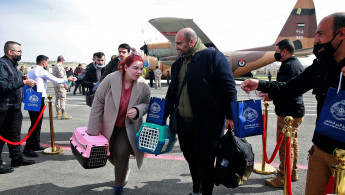Half of Jordanians have considered emigrating as economy bites: MENA study reveals
Almost half of Jordanians have considered leaving their home country, according to a pan-Arab world survey whose results were released Wednesday, with economic worries a driving factor.
Nearly 23,000 people were interviewed across nine Arab countries plus the Palestinian territories for BBC News Arabic by the Arab Barometer, a research network based at Princeton University.
According to the survey, 48 percent of Jordanians surveyed said they wanted to leave the country, outranking war and crisis-torn countries including Iraq, Libya, Sudan and Tunisia.
"It's an alarming number for a country which seems to be one of the more stable ones," Michael Robbins, director of Arab Barometer told The New Arab.
Some nine-tenths of Jordanians who said they had considered leaving the country said economic factors were the main reason.
Jordan has not seen the war or political turmoil of other countries in the Middle East and North Africa, but it is grappling with billions of dollars in debt and soaring prices of staple goods.
A staggering two-thirds of Jordanians under the age of 30 wanted to leave the country, according to the survey. Youth unemployment in the country stands at a shocking 50 percent, the World Bank said in May.
|
Jordan was closely followed in the survey results by Sudan and Tunisia, where 46 and 45 percent of the population respectively said that they had considered emigrating.
Lebanon, currently in the grips of a financial crisis that has left an estimated three-quarters of the population living below the poverty line, and Tunisia saw the biggest jump in the number of people considering emigrating, recording a 12 percent rise on its 2018-19 survey.
Two thirds of Tunisians under 30 and 60 percent of Lebanese in the same age range said they wanted to leave the country.
In Tunisia, GDP is lower now than in 2011, when the Jasmine Revolution got into full swing. The country's economy was hard hit by the Covid-19 pandemic, and the government led by power-grabbing President Kais Saied is desperately seeking a loan from the International Monetary Fund to stay afloat.
"Across the region, people wanting to emigrate mainly cite economic reasons as their motivation for migration," Arab Barometer said in its migration report.
"Security issues, education opportunities, corruption, and political reasons follow, but are far less important compared to economic factors."
Economy was people's main concern in most of the countries surveyed, with the exception of Iraq and Libya, where corruption and instability were the main concerns respectively.
Food insecurity is proving a major worry across MENA, with governments scrambling to secure staple food provisions as supplies from Russia and Ukraine dry up.
In more than half the countries surveyed - most before Russia's invasion of Ukraine - more than 50 percent of respondents indicated that they have run out of food before they had money to buy more.
Prices of staples including bread and sunflower oil have risen globally since Russia invaded Ukraine in February. Both countries are major exporters of key materials including wheat and fertilisers.
Arab Barometer worked with universities and polling organisations in the Middle East and North Africa to conduct the survey between late 2021 and Spring 2022.
The poll sought to "provide a unique and detailed insight into the contemporary lives of Arabs", the BBC said, and "comprehensively capture people’s attitudes" on issues including racial and gender equality, attitudes to democracy, and even hopes for the future.
Respondents to the survey were typically nationals of the included countries.
Both Jordan and Lebanon are home to massive refugee populations, which tend to suffer more greatly from economic strife and discrimination and could well have made the percentage of people seeking to leave the countries even more emphatic. Jordan is home to millions of Iraqi, Palestinian and Syrian refugees. More than a quarter of Lebanon's population have fled Syria alone.
"Typically we only include nationals... if someone has a nationality card typically they are allowed to participate in the survey. If they don't then we don't include them," Robbins said of the Arab Barometer study.
"Given the numbers of migrants who came to Jordan - a lot of the Iraqis are now gone - a lot of it could change how the overall country looks, so we've tried to keep it to nationals just to keep our trend lines more constant."
Though the survey is among the largest of its kind, it was conducted in less than half of Arab states. Syria was deemed too dangerous to send researchers to, while some Gulf countries outright refused to allow for the study to be conducted.
Its results are arguably already being used to cast Arab opinion as homogenous. A BBC headline for an article about the survey read: "Arabs believe economy is weak under democracy", after a majority of the respondents in seven of the states said a country's economy was weak under a democratic system.





 Follow the Middle East's top stories in English at The New Arab on Google News
Follow the Middle East's top stories in English at The New Arab on Google News


